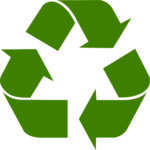
In the 21st century, we are becoming increasingly aware of the impact of our daily decisions on the environment. But did you know, your daily cleaning habits can also hugely impact the global and local-scale environment you’re in? We have compiled together a list of ways you can become more eco-friendly with small changes to your daily cleaning habits.
According to UKDN Waterflow (LG) Ltd wet wipes take approximately 500 years to biodegrade. This means that after you use a wipe to wash one patch of dirt, the wipe will stay in landfill for 500 years! The solution: use reusable, microfibre cloths instead. Not only are they more efficient at cleaning than wipes, they cause less landfill and less total water and energy is used to produce the cloths you use in a lifetime.
Cleaning with products (e.g. vacuums and washing machines) that use more efficient energy technology means that less energy is wasted on sound or heat and less energy is consumed overall. The energy efficiency means less fossil fuels are burnt for the energy.
You can find many eco-friendly detergents on the Jangro website here.
This prevents the use of harmful chemicals and purchase of plastic bottles. There are several benefits for you too. Using homemade products can also be safer for you as you aren’t exposed to strong detergents. It can also save you quite a lot of money! Re-use your home products using our guide (DIY alternatives to bleach).
Plastic is constantly piling up in landfills because it has poor degradation properties. Due to poor recycling and the increased demand for plastic, new plastic is constantly manufactured and sold instead of recycled materials, thus continuing the chain of plastic pollution globally. Millions of tonnes of plastic also end up in the ocean each year which poses a threat to marine life all around the globe.
To help reduce the demand and manufacturing of plastic products, swap out your plastic mops, brushes, scrapers etc. for environmentally friendly alternatives such as bamboo brushes.


Product labels contain detailed information of the correct storage, use and disposal of products. Proper disposal of products is a necessity as it can impact recycling, pollution and local-scale habitats. Contaminated recycling just ends up going to landfill and so we have more and more rubbish decomposing and releasing greenhouse gases instead of being re-used as something else. If a container has a recycling symbol on it… Recycle it!
As well as this, some detergents can be hazardous to the environment and aquatic life if not disposed of correctly. These will have a hazard symbol of a fish in a lake on them (as shown above). Read the safety data sheet or contact the supplier if you are not sure of how to dispose of a detergent safely.